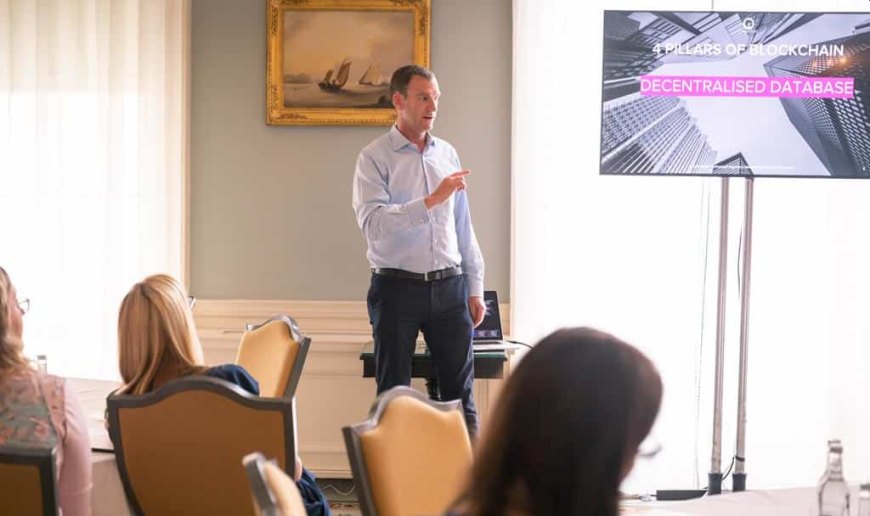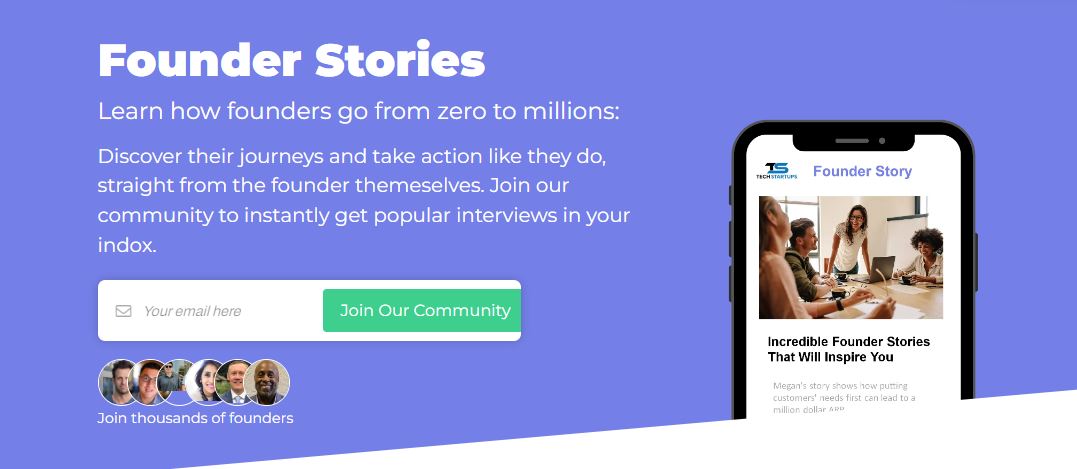Founder Story: Interview with Steve Pomfret, CEO of Cygnetise

Welcome to another edition of our Founder Stories series, where we sit down for insightful conversations with startup founders and entrepreneurs who are making waves in the world of technology. Today, we’re thrilled to have Steve Pomfret, CEO of Cygnetise, join us.
Cygnetise is a multi-award-winning company that’s changing the game with its application of blockchain technology to streamline Authorised Signatory Management (ASM). Established in 2016, Cygnetise stands out as one of the early adopters of blockchain in the enterprise sector, showcasing real-world applications that have reshaped industry practices. It’s a testament to their innovation and resilience in a rapidly evolving landscape.
Introduction and Background:
Can you share a bit about your background and what inspired you to start your own business?
I spent around twenty years working within large banks, not as a banker but in operational change. My remit was to improve how the banks operated to help them to reduce risk and save costs. This mainly included solving their pain points but also utilizing technology more effectively. Although I loved what I did, I left to set up my own limited company and did the same as a freelancer. That’s when I got the taste and I guess confidence for running my own business.
During this freelancing period, advising banks on how to operate better, I schooled myself on innovative new tech, especially blockchain. I realized that there were a lot of people trying to do things in this space but there wasn’t sufficient understanding of how tech was adopted by big banks, how much it cost, and generally how difficult it was to do. I started to visualize a viable product, that solved a real-life problem, had a massive market, could be easily adopted, and most importantly had a decent business case. That’s when I started Cygnetise.
What were you doing before you started your startup, and how did your past experiences contribute to your entrepreneurial journey?
I left university with a BEng (honors) in Civil Engineering but ended up working in operational change within large banks and brokers, including Credit Suisse, UBS, Instinet, and Deutsche Bank. I acted as an internal consultant, troubleshooting to improve efficiency and minimize risk in areas including emerging markets, investment banking, custody, fund administration, wealth management, trade finance, and corporate banking in many different countries.
This gave me insights into what their pain points were, how they were attempting to address them, and what was not being addressed. I spent time working in the US, Switzerland, France, the Netherlands, Germany, Italy, and Russia which gave me great experience in building and managing teams in different cultures and environments.
Inception and Motivation:
What was the initial idea or problem that led to the creation of your startup?
Working in operational change led me to recognize the considerable risks and inefficiencies that traditional manual and paper-based authorized signatory registers posed to financial institutions – and just how hard this was to address. Every large organization has to manage numerous authorized signatory lists, so this was a universal problem that was not being addressed with any innovative tech solutions.
Can you describe the moment when you decided to pursue your startup idea, and what motivated you to take that leap?
I’d identified the serious issues in authorized signatory management and the sheer scale of the problem. My passion for and knowledge of blockchain combined with this and I realised that it was the ideal technology to address this issue. At the time, a lot of people were talking about the adoption of blockchain in enterprise but there weren’t really convincing use cases coming through that had a practical benefit and a business case. It also felt like the potential of blockchain was overlooked as only techies truly understood its capabilities, but they were not best placed to articulate them to laypeople. Authorized signatory management was a huge global issue that wasn’t already managed by a technological solution and blockchain was ideally suited to solve it. That’s when I decided to take the leap.
Challenges Faced:
What were some of the major challenges you faced in the early days of your startup?
Having to wear so many hats before I could hire any team members was a lot to handle, but I also found it really exhilarating. I think all startups have issues with the runway in the early days while building their MVPs.
How did you overcome setbacks and challenges, and what did you learn from those experiences?
Enthusiasm and a clear vision just drive you on. If you’re enjoying what you’re doing and have a clear vision then you can do whatever you need to. On the runway front, I was completely new to the startup world when I began and found I just naturally ran a really tight ship with a disciplined budget to get things done so we were running on a shoestring.
Key Milestones:
What are the key milestones that stand out in your startup journey so far?
Securing our first VC funding was obviously a pivotal moment. The first sale felt the best, though! Having someone willing to pay money for your product is the ultimate validation – not just a POC or a trial. A customer is only really a customer when they are paying for your product.
Can you share a moment or accomplishment that made you particularly proud?
The first sale to a financial institution was a massive moment for me as it’s so hard to get through the door due to due diligence and the size of these organizations. And you know if you can sell to one, you can sell to more.
Lessons Learned:
What are some valuable lessons you’ve learned as a founder that you wish you knew when you started?
It would have made it less painful if I had understood better earlier on what type of roles to hire for at certain points in time. This would have made the journey faster and easier.
Is there anything you would do differently if you could go back to the beginning?
It’s very hard to say if I would have done anything differently as it’s a sliding-doors scenario. We might have done something differently and it wouldn’t have worked out.
Team Building and Leadership:
How did you go about building your team, and what qualities do you look for in team members?
Culture is everything. Having spent twenty-plus years in large financial institutions, I knew how important it is to form the right culture. It’s not just about specific skills. It’s the traits that people have and that they buy into what you’re doing, rather than just hiring people with only the required experience. When hiring, I try to be as transparent as possible, I almost try and put them off! If they’re still excited by the proposition, they are the type of person we want.
Can you share insights into your leadership style and how it has evolved over time?
I learnt a lot about leadership while working in the banking sector and managing teams with different cultures all over the world. It’s key to strike a balance between motivating people and making sure they’re aligned with the ultimate business goal.
Growth Strategies:
What strategies did you employ to grow your startup, both in terms of customer acquisition and team expansion?
Initially, with customer acquisition, we had a small target geographical area we focused on, the Channel Islands. This is a key offshore financial services location that has a really forward-thinking attitude when it comes to adopting innovative technologies. How and where to expand the team has always, and I think always will, be a challenge. As far as location is concerned, all expansion to date has been in the UK but this should change in the near future when we intend to have a physical presence in the US.
How do you approach innovation and staying competitive in your industry?
We keep our innovation aligned with the demands of our customers. We’ve undertaken a couple of design partnerships with key clients that have been fruitful and we’ll continue to do so.
Community and Networking:
How important has networking and community engagement been for your startup?
Networking is absolutely vital. Tapping into existing investors’ networks to expand contacts has also been so valuable in securing experienced advisors who provide significant value.
Are there specific communities or networks that have played a significant role in your journey?
We are a member of Innovate Finance, the independent industry body and voice of UK FinTech. This is so valuable, from attending their events and roundtables to inputting on policy and proposed regulation responses. We’re also a member of Digital Jersey which has been great for introductions, networking, co-working spaces, and more, and we won one of their awards.
Tech accelerators and innovation challenges have also been really beneficial for Cygnetise. We’ve been in two Plug and Play accelerator programs, one in the Middle East and one in Japan, were winners in the Digital Isle of Man ‘Fintech Innovation Challenge’ and won the LHoFT Fintech Innovation Hub accelerator in Luxemburg. Being part of all these communities has added knowledge to the team, expanded our contacts, and opened doors for the company.
Adaptability and Pivots:
Have there been instances where you needed to pivot or adapt your business model? How did you navigate those changes?
We’ve been really fortunate not to have to deviate at any point so far.
How do you stay adaptable in the face of evolving market conditions?
Planning is key. Having a plan, A, B, C, D, etc., for every conceivable scenario should be considered. I think I got used to this practice during my days in banking operations. We had to have a contingency plan for every scenario, however bizarre and unlikely it might be. Running a lean startup also gives you a better chance of weathering runway challenges.
Advice for Aspiring Founders:
What advice would you give to aspiring entrepreneurs who are just starting their journey?
Don’t do it – only joking! It’s tough but very rewarding. Be prepared for the roller coaster, you can never prepare for events you can’t see coming. Things happen but you find a way through. Understand that people are willing to help and utilize this. If you are on it and do what you say you’re going to do, then people come to trust you. That trust brings so much advice, help, support, and investment with it.
Are there resources or books that you found particularly helpful on your entrepreneurial path?
Crossing the Chasm by Geoffrey A Moore is brilliant. It’s the best tech-startup bible I’ve read by a long way.
Current Day and Future Plans:
Can you provide an overview of where your startup is today and any exciting developments on the horizon?
We raised our Pre-Series A round last year and have been growing fast since, rapidly expanding the team and our client base. We have a couple of really exciting things in the pipeline but I’m unable to share any details at the moment.
What are your future plans and goals for the continued growth of your business?
Our current focus is on expanding further internationally and entering new verticals. While we can reach markets in direct sales from any location, we are starting to move into proper enterprise deals (B2B2B), where banks license the product for use for their large corporate clients. In this case, the physical location of teams is essential, i.e. where the customer is. s mentioned, the US is the focus in the coming months.
About Cygnetise:
Cygnetise is a multi-award-winning company applying blockchain technology to revolutionize the process of Authorised Signatory Management (ASM). Founded in 2016, it was one of the first enterprise blockchain platforms to demonstrate the successful real-world application of blockchain to industry problems, and a rare surviving and thriving example.
The Cygnetise blockchain-powered SaaS solution simplifies and solves the pain of ASM by enabling operations and finance departments to digitally manage and share authorized signatories and delegated authorities, in real-time, with their banks and other counterparts, making the process more efficient, transparent, and secure. This collaborative signatory management platform significantly reduces the risk of fraud, transforms operations and customer journeys, facilitates business continuity, and strengthens governance.
Cygnetise enables their customers’ full control of employee signing authority management at any time, dramatically increasing efficiency, cutting costs, and saving over 90% of the time spent on manual and paper-based tasks. Since launching as the first blockchain company of its kind, the company has continued to expand its global reach and is now live in over forty countries for multiple clients including PWC, Societe Generale, Willis Towers Watson, Charles Schwab, JTC, Raymond James, ADNOC, Evelyn and SEI.
Cygnetise’s cloud-based SaaS model enables continuous functionality releases and upgrades. The proprietary technology and use of blockchain can be classified as ‘Proof of Existence’, allowing customers to share real-time updates on a P2P (peer-to-peer) basis. The easily adopted, low-maintenance SaaS software enables the creation and distribution of authorized signatory lists entirely in a highly secure, tamperproof decentralized database.
The company has secured investment from investment syndicate Adjuvo, West Coast specialist blockchain VC firm, Bloccelerate, US VCs 1414 Ventures and Massive, and is a member of Innovate Finance. Cygnetise was selected for the Mayor’s International Business Programme (MIBP) 2022 and was a member of the MIBP North American Fintech Trade Mission delegation.
Cygnetise is currently in the first cohort of the Mayor of London’s Grow London Global program and has won numerous awards, including the Fintech Award in the 2023 Digital Jersey TechAwards, the inaugural Digital Isle of Man Fintech Innovation Challenge, and Best Enterprise Blockchain Company in the City AM Awards 2020. The company was included in Sifted’s Regtech startups to watch in 2023 and selected for the 2024 RegTech Analyst RegTech100 list.
Click below to read more Founder Stories…


